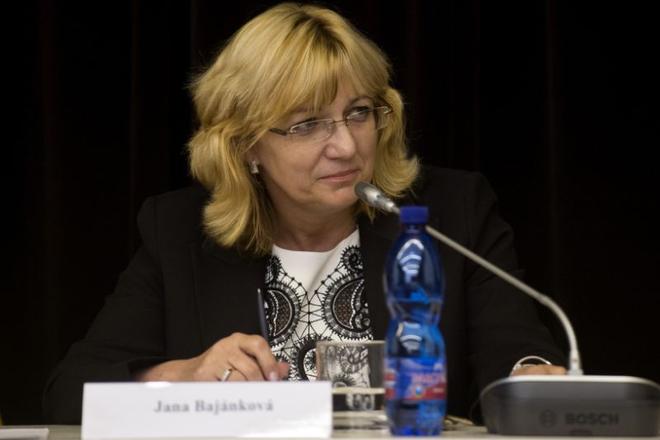SUPREME Court judge Jana Bajánková was elected the head of the Judicial Council, a top body overseeing the operation of the judiciary in Slovakia, on September 16 after 10 of the 16 voting council members voted for her in a secret ballot, the Sme daily reported on its website. There were no votes against, while six members of the council abstained from voting.
Bajánková, who failed in the first-round bid for Supreme Court head, nominated by Justice Minister Tomáš Borec, takes over the post previously held by Štefan Harabin, who also served as president of the Supreme Court. However, a recently passed constitutional amendment divides the post of Supreme Court president from the position of Judicial Council boss as of September.
“I want to assure everyone that I will be pushing for the interests of all the judges,” Bajánková, the sole candidate for the post, said after her election, as quoted by the TASR newswire.
Ahead of the vote, Bajánková said that it is necessary to increase the credibility of the council and change the style of communication with the public as well as inside the council.
Bajánková was nominated by seven members of the Judicial Council, namely by Milan Ďurica, Imrich Volkai, Ján Slovinský, Eva Fulcová, Ľuboš Sádovský, Jozef
Maruščák and the deputy chairman of the council Ján Vanko.
The election is being closely watched by judicial ethics watchdogs, the media and the international community. Ambassadors of the United States, the Netherlands and Ireland, for example, along with representatives of the embassies of France, Great Britain, Finland and Croatia are watching the election as well, according to Sme reports.
Bajánková, born on July 13, 1959 in Bratislava, graduated from the Law School of Comenius University and started working at the Bratislava District Court as a judicial clerk. After passing the judiciary exam in 1985, she served as chairwoman of a senate of the Bratislava District Court. From 1989 to 1996, she operated at the Bratislava Regional Court as a member of the senate and from 1993 as chairwoman of the senate. Since 1997, Bajánková has been serving in the Supreme Court: since 2003 as a chairwoman of the senate and since 2006 as the chairwoman of the civil-legal collegium. Since 2007, Bajánková has been serving as a member of the Judicial Council.
Bajánková ran for the top Supreme Court post on May 19 but failed to win, as did her rivals in the vote: Harabin, who has held the twin post of Judicial Council chair and Supreme Court president since 2009, and Zuzana Ďurišová, who represented judges who are critical towards Harabin.
Shortly before the vote, Harabin said in an interview with Sme that it does not matter to him whether he wins the race or his “friend Bajánková”. Bajánková is believed to be a close collaborator of Harabin in the Supreme Court, according to Sme. Minister Borec described Bajánková as a candidate with a real chance of winning the Supreme Court president vote.
“I view it as an advantage that Bajánková will be able to communicate with all Supreme Court judges in a normal, professional manner,” said Borec in May 2014.
Changes to the council
One week ahead of the election of the Supreme Court president and head of the Judicial Council, parliament dismissed Dušan Čimo as a member of the Judicial Council, which picks the heads of both bodies, and replaced him with the head of the district court in Spišská Nová Ves, Ján Slovinský, on September 11. Deputy speaker of parliament Jana Laššáková of the ruling Smer party proposed the dismissal, which passed with Smer’s support, while the opposition ignored the vote.
Čimo, elected in February 2012 by the rightist parties, is a long-time critic of Harabin and has not refuted claims that this could be the reason for his dismissal, which in fact, was believed to have shifted the balance of power in the council before the elections.
The opposition criticised Čimo’s dismissal, saying that it had just 24 hours to propose a new candidate, while Slovinský signed his agreement with the candidacy before the opposition even knew that Smer wanted to remove Čimo.
Opposition MPs further called the move a deliberate effort by Smer to secure votes for the upcoming election for the new Supreme Court and Judicial Council head, the SITA newswire wrote.
Neither Laššáková nor other Smer MPs have offered an explanation for her step.
“Considering the current practice in the Supreme Court there is no need to specify the reason for recalling a Judicial Council member,” said the head of the Slovak parliament’s constitutional committee, Róbert Madej of Smer, as quoted by TASR. “Even President Andrej Kiska, who recalled three members of the Judicial Council, approved this practice; the government also recalled one council member recently.”
Meanwhile, the government elected its own nominee to the Judicial Council, appointing barrister Ján Havlát, founder of the Havlát&Partners law firm and a member of the board of the Slovak Bar Association. Havlát takes up the post on September 11, replacing Jaroslav Chlebovič, whom the government dismissed on August 20, TASR wrote.



 Jana Bajánková (source: TASR)
Jana Bajánková (source: TASR)